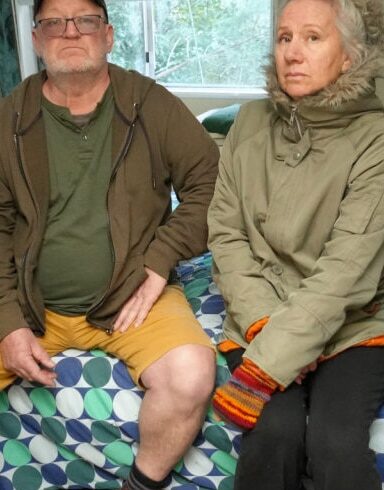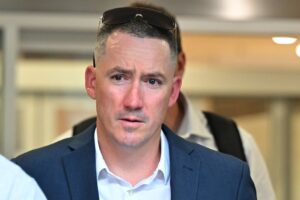
It’s been years since the Kemp family have enjoyed a meal, watched TV or even slept in their own house.
In October 2020, a landslide cascaded down a slope in Sydney’s Northern Beaches, dislodging boulders that took out the side of the building.
It was the second property ravaged by natural disaster — seven years earlier, their family home in the Blue Mountains was lost to a bushfire.
“They put their entire life savings and all of their retirement into this [Great Mackerel Beach] place,” Harry Kemp said of his parents, Ray and Lorraine.
Ray and Lorraine Kemp’s retirement has been put on hold indefinitely after their superannuation went towards the Great Mackerel Beach property. (ABC News: Patrick Thomas)
The family were not home when authorities called about the incident in the isolated suburb home to about 50 permanent residents.
“One of the rooms has been hit by a massive boulder … two of the walls have come straight off, the roof was damaged as well,” Mr Kemp said.
The deck is gone, a water tank under the house destroyed, and the family is still investigating if the foundations were “knocked off its axis”.
A neighbouring house was completely destroyed.
Due to bureaucracy and the rock face remaining unsecured almost five years on, the Kemps are stuck in limbo — unable to repair the damage or part ways with the home.
The family have only been able to put a tarp to try “stop the bugs, animals and moisture getting in”.
“They were … like why us, why is this happening again,” Mr Kemp said of his parents.
“It’s something you don’t want to go through once in your life, let alone twice.”
Government department denies liability
The Kemp’s house, marked in blue, in relation to the rockfall site. (Supplied)
The Kemps say they have been told the remaining boulders will fall at some point, in “not a matter of if, it’s a matter of when”.
Great Mackerel Beach is surrounded by Ku-ring-gai Chase National Park, which is managed by the NSW National Parks and Wildlife Service (NPWS).
Geotechnical assessments after the landslide found the cliff line above private properties had other potentially unstable rocks, and the risk to life from future rockfalls was “unacceptable”.
Harry Kemp said the situation had been “pretty disastrous” for his parents Ray and Lorraine. (Supplied)
NPWS said because it was a natural event, it was not liable for resulting damage.
It said there were “no feasible long-term risk mitigation options”, ruling out rock bolting, cabling, de-scaling, boulder removal or pre-warning systems.
“Engineers advised that rock catch fencing behind the other properties … may be feasible but cannot guarantee that a similar event would not occur in the future,” a 2022 report stated of an option which would have cost approximately $9 million to install.
Acquiring the high-risk zone properties was estimated to cost the government $2.1 million but said “NPWS is not required to buy the properties and has no funding to acquire these properties”.
The Kemps have corresponded with local members and councillors over the years, and remain in dispute with their insurer.
‘It’s pretty disastrous for them’
Mr Kemp said his parents were between a “rock and a hard place” because they cannot make repairs without an approved development application (DA).
“Council won’t issue one until the rock face is made secure … even if it was theoretically allowed, I don’t think we would want to be there because you have these 100-tonne boulders looming over your head.
“And they’re still having to pay council rates at the property, pretty ridiculous.”
The boulder from the landslide is thought to have split, wiping out a neighbouring property completely. (ABC News: Patrick Thomas)
In a statement, Northern Beaches Council said it made and levied rates in accordance with legislation, and it would “encourage early engagement with technical experts” for DAs of this nature.
A spokesperson said that while NPWS provided some information regarding rockfall risks, the state body had “not shared other important technical information about the risk assessments it has undertaken at this site” to council.
In a letter seen by the ABC, Environment Minister Penny Sharpe rejected a request for a special circumstance act of grace payment to the Kemps in March.
“NPWS has no present legal obligation to compensate Mr and Mrs Kemp for the detriment caused to them by the Incident,” she wrote at the time.
Ms Sharpe declined to comment for this story.
NSW Minister for Environment Penny Sharpe rejected an act of grace payment request for the Kemp family. (AAP: Nikki Short)
Mr Kemp said it was “disappointing to see NPWS and council attempting to deflect responsibility”.
“We would just like [the state government] to do something,” Mr Kemp said.
“Plans have been put on hold, my dad’s retirement has been put on hold … It’s pretty disastrous for them.”
Pittwater MP Jacqui Scruby said it appeared “all avenues have been exhausted” for the Kemps after meeting with NPWS and the Office of the Environment Minister.
“I will continue to advocate for [Ray] Kemp and any other affected constituents to ensure they are treated fairly and transparently under the law,” she said.
Protocol reworded after landslide
Great Mackerel Beach, also known as “Mackerel”, is home to about 50 permanent residents. (ABC News: Patrick Thomas)
A Department of Environment spokesperson said local council identified a “high geotechnical risk and expected geohazard event frequency” in 2009 — factors, they say, that were indicated in the contract of sale when the Kemps bought the property five years later.
“It is incumbent upon individual land purchasers to be aware of potential risks when purchasing a property, and to consider their potential insurance needs,” they said.
“There were no actions undertaken or not undertaken by the NSW National Parks and Wildlife Service … that prompted the event.”
The Kemps said there was a “one-line mention” of an environmental plan for the wider Pittwater area, but “no specific reference to any geotechnical hazard” at their house.
The house, covered in mould after being exposed to the elements for years, stands still and empty. (ABC News: Patrick Thomas)
A 2020 landslide procedure document on how NPWS responds to “unacceptable” risks said a treatment plan “must require mitigation” and “accepting the risk was not an option”.
A version republished last year was reworded to say NPWS could “determine the feasibility of the risk treatment plan” instead.
NPWS said all park management polices were subject to regular review to account for “new information”, and that the requirement to consider factors like resources had not changed.
Damage caused by a landslide behind the Kemp’s house shortly after the incident. (Supplied: Ray Kemp)
In a statement, it acknowledged the “significant impact” the incident had on affected residents, and was “sympathetic” to the concerns of property owners.
Mr Kemp said NPWS should not be absolved “of their responsibility to address the current risk posed by the rock face following the landslide”.
“That’s the point we’ve been trying to make for the past five years — with no success so far.”





